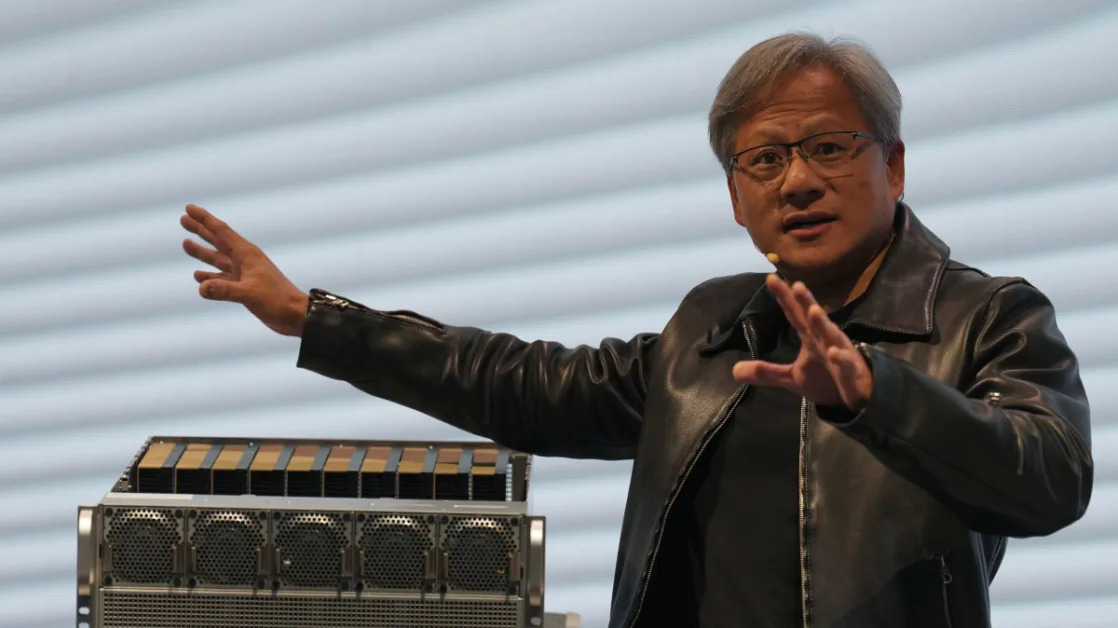After making several key announcements at the Consumer Electronics Show (CES) 2025, Nvidia ( NVDA ) seems to be preparing for a major shift.
💰💸 Don’t miss the move: SIGN UP for TheStreet’s FREE Daily newsletter 💰💸
The artificial intelligence (AI) leader has enjoyed an undeniable rise to the top of its booming industry, capitalizing on the global rush to build and scale generative AI models.
Nvidia’s graphics processing units (GPUs) have played an integral role in the rise of this new technology that has helped revolutionize entire industries.
With competition rising throughout the AI chip market, though, Nvidia is reportedly taking steps to shift its operations away from the focus on the GPUs that made it a tech sector leader.
This suggests that the AI field is on the verge of a major shift, one that has the potential to mint a new group of market winners. If that is true, though, Nvidia has shown it does not plan on being left behind.

Nvidia is targeting a hot new tech market
Over the past few years, the name Nvidia has become synonymous with powerful GPUs that power AI large language models (LLMs) such as OpenAI’s ChatGPT.
But over the past few months, the market has shown signs of shifting towards different types of chips. In December 2024, an earnings report from fellow tech sector leader Broadcom ( AVGO ) pointed toward a rising demand for custom silicon chips, a direct competitor for GPUs.
Related: Broadcom CEO sounds alarm on crucial shift in AI-chip market
Nvidia seems to have received this message.
A local outlet has reported that Nvidia plans to hire 1,000 workers in Taiwan to develop its Application-Specific Integrated Circuit (ASIC) technology.
ASIC chips are custom-made microchips designed to perform a specific function or task. Unlike GPUs, which can handle multiple tasks at once, ASICs are more specialized but can complete functions at an extremely efficient speed.
Additionally, companies may have a financial incentive to avoid highly priced GPUs. Forrester analyst Alvin Nguyen predicts that “Buying (AI inference chips) should be cheaper than buying the ultimate GPUs from Nvidia and others.”
TechRadar reports that demand for ASIC chips is indeed rising as the need for “chips optimized for real-world AI applications” such as LLMs and generative AI models continues to grow.
The outlet also notes that ASICs offer superior quality for inference, the term used when an AI model successfully makes a prediction or conclusion.
More Tech Stocks:
Recent data predicts that the inference AI chip market will likely continue growing, reaching a $90.6 billion valuation by 2030 after being worth less than $16 billion in 2023. This means that companies that can successfully produce these chips before their competitors will likely have a key advantage.
This Taiwan expansion news suggests that Nvidia has found a strategic new area of focus and has recognized that the future of AI chips likely lies in custom silicon chips such as ASICs.
Can Nvidia beat its rivals on a new front?
Broadcom isn’t the only Nvidia rival that recently doubled down on custom AI chips. Marvel Technology ( MRVL ) also focuses on procuring a piece of the market producing custom multi-chip systems.
All companies in the space must compete with Google ( GOOGL ) , which has been working on developing custom AI accelerators for years. In December 2024, the tech leader announced the release of its Tensor Processing Units (TPU), on which it trains its advanced Gemini AI 2.0 model.
Related: Experts question analyst report on Wall Street losing jobs to AI
At the time, TechRadar reported that it would put companies like Nvidia and Advanced Micro Devices ( AMD ) on high alert. Now, Nvidia's shifting focus to manufacturing similar chips suggests that its leaders see the high growth potential of the custom AI chip market.
This pivot seems to be coming at a good time for Nvidia. Earlier this week, news broke that some prominent customers were delaying their orders due to concerns about Nvidia chip racks overheating.
The list of Nvidia customers delaying their orders includes Microsoft ( MSFT ) , Google, Meta Platforms ( META ) and the Amazon ( AMZN ) cloud unit. This isn’t the first time that problems regarding Nvidia chips overheating have been reported in recent months.
Between order delays, overheating chip concerns, and problems that may stem from President Joe Biden’s new AI framework, which limits where tech companies can ship, Nvidia is facing a complicated industry outlook.
It may make sense for the company to focus on expanding into a different market with high growth potential, exactly as it seems to be doing by hiring new ASIC engineers in Taiwan.
Related: Veteran fund manager issues dire S&P 500 warning for 2025


